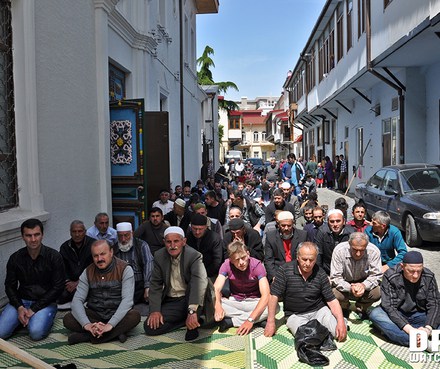საერთო ცხელი ხაზი +995 577 07 05 63


Photo:DFwatch.net
Human Rights Education and Monitoring Center (EMC) responds to the issue of constructing a new mosque in Batumi and critically evaluates the ignoring policy of the state in relation to the challenges faced by the Muslim community.
As it is known to the society, throughout years, a significant challenge the Muslim community has been facing is the issue of constructing a new mosque in Batumi. The historical Orta Jame mosque in the city is not sufficient for all men and women, due to which hundreds of people (500-700 members of the community) are forced to pray on the streets. Muslim women are largely hindered from participating in the prayers inside the mosque. [1]
After the 1900s, the Muslim community has been asking the consecutive governments to support the process of constructing a new mosque. However, the state has never made a decision about resolving this historical need and request of the Muslim community. The issue of the new mosque has been a topic of political speculation and turkophobic discourse from different political groups. On numerous occasions, the ruling political group gave the Muslim community public pledges to grant land ownership to build the mosque. However, this promise has not been fulfilled. [2]
By contrast, with active involvement of the State Agency on Religious Affairs, a large majority of religious leaders in the Georgian Muslims’ Union signed a memorandum, through which they requested the transfer of facilities for the residence of the Mufti Division and a madrassa instead of the construction of the mosque. Importantly, the document was signed in the same period when the Government enacted the practice of financing four religious organizations (Muslim community, Jewish community, Catholic Church, Armenian Apostolic Church); a large part of this funding goes to the Muslim community and a significant portion is spent for the salaries of religious leaders. [3] By conceding the mosque issue by the Georgian Muslims’ Union, which resulted from the intervening, control-based policy of the state, the alienation between the Muslim community and its formal religious institution deepened and became more visible.
It is also worth noting that the Government and the Georgian Muslims’ Union under its control often underline the issue of expanding the existing mosque, instead of building a new one, which, according to Muslims, is an unjustified alternative. The historical building of Orta Jame is cultural heritage, and its expansion will essentially damage the building. In addition, violating the rights of real estate property owners in the surrounding area could become the basis for social discontent of the local population towards the mosque issue.
In this political situation, the Muslim community initiated a self-organized process and in March 2016, the initiative group for a new mosque in Batumi [4], addressed the Government of Adjara, the Batumi City Hall, and the Government of Georgia with the request of granting land for a new mosque, with 12,000 signatures and in an independent manner, circumventing the Georgian Muslims’ Union. Importantly, up until now, the Government has not made a decision or had formal communication with the initiative group.
In the conditions when the Government ignores the needs of the Muslim community, the community was forced to purchase land in Batumi with own resources, which will become a serious economic burden for its members.
EMC criticizes the non-secular practice of transferring enormously large-scale real estate to the Orthodox Church by the state. [5] EMC considers that, when the Government continuously transfers tens of land areas and facilities to the Patriarchate, the factual negation of granting land to the Muslim community in Batumi points to the discriminatory policy of the state. It is important to note that EMC is also planning to appeal to the Public Defender on the basis of the Law on the Elimination of all Forms of Discrimination in the near future.
Throughout this period, EMC, together with other nongovernmental organizations, has been supporting the activities of the Muslim community towards the construction of a new mosque through legal aid and public advocacy and once again expresses its solidarity with the community [6], which created an important incident of grassroots self-organization and civic consciousness by putting the mosque issue on the political agenda. The organization will continue working in this direction in the future.
It is worth noting that considering the ineffective and non-secular policies of the state in response to numerous cases of intolerance and violence against the Muslim community, ignoring the initiative for the new mosque deepens the marginalization and alienation of the Muslim community.
Considering the above-mentioned, EMC again calls for the Government of Adjara and the Government of Georgia to discuss the issue of granting land to construct a new mosque in Batumi with the participation of the mentioned initiative group and other stakeholders and grant land in an accessible area to the Muslim community. In addition, EMC calls for the local government to conduct the process of issuing construction permits for the mosque in a legal, non-discriminatory manner.
https://emc.org.ge/2016/04/08/emc-53/
https://www.youtube.com/watch?v=M1i7wDyRXYM
https://emc.org.ge/2016/07/16/emc-101/
https://www.facebook.com/permalink.php?story_fbid=581890561983598&id=471879052984750
https://emc.org.ge/2016/07/16/emc-101/
https://emc.org.ge/2016/03/18/emc-21/
The website accessibility instruction